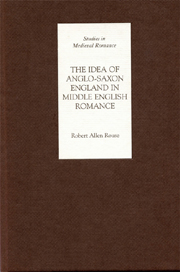Book contents
- Frontmatter
- Contents
- Miscellaneous Frontmatter
- Acknowledgments
- 1 Anglo-Saxonism: The Remembrance and Re-Imagining of the Anglo-Saxon Past
- 2 Remembering Alfred in the Twelfth Century
- 3 The Romance of the Anglo-Saxon Past
- 4 The Romance of English Identity
- 5 In his time were gode lawes: Romance and the English Legal Past
- 6 Literary Terrains and Textual Landscapes: The Importance of the Anglo-Saxon Past in Late-Medieval Winchester
- Conclusion
- Bibliography
- Index
2 - Remembering Alfred in the Twelfth Century
Published online by Cambridge University Press: 12 September 2012
- Frontmatter
- Contents
- Miscellaneous Frontmatter
- Acknowledgments
- 1 Anglo-Saxonism: The Remembrance and Re-Imagining of the Anglo-Saxon Past
- 2 Remembering Alfred in the Twelfth Century
- 3 The Romance of the Anglo-Saxon Past
- 4 The Romance of English Identity
- 5 In his time were gode lawes: Romance and the English Legal Past
- 6 Literary Terrains and Textual Landscapes: The Importance of the Anglo-Saxon Past in Late-Medieval Winchester
- Conclusion
- Bibliography
- Index
Summary
THE dominant textual mode of history in England during the first half of the twelfth century was that of the monastic chronicle. Chroniclers such as William of Malmesbury and John of Worcester constructed a view of the Anglo-Saxon past that played an important social and political function by representing England as a once-virtuous kingdom that had fallen from God's grace, and which had been healed by Henry I's marriage to Edith (renamed Matilda after the marriage), niece of Edgar Atheling and grand-niece of Edward the Confessor. Henry's restoration of the ancient line of Wessex lent a weight of genealogical legitimacy to his rule. The justification of the Conquest seems to have been one of the major reasons for the Anglo-Norman interest in the pre-Conquest past during the first half of the twelfth century. The politically informed Anglo-Saxon past that had been produced by the chroniclers became for future historians a model of the Anglo-Saxon past.
However, this version of the pre-Conquest past was one that was soon challenged. Geoffrey of Monmouth's Historia Regum Britanniae, whether intended as a parody or not, and despite the condemnation and criticism that his text received from other chroniclers, had a dramatic effect upon the conception of the English past after it appeared. From the time of King Stephen, England's Anglo-Saxon past suffered in comparison with the Arthurian myth. Anxious both to unite his kingdom under a single historical myth and to provide his nation with Trojan descent, Henry II was an active participant in this refashioning of the past. His close association with the discovery of Arthur’s grave at Glastonbury (thus reminding the Welsh that their Arthur was indeed safely dead and buried), and his naming of his first son Arthur (as an English Rex Futurus), lent a royal seal of approval to an English Arthurian history.
- Type
- Chapter
- Information
- Publisher: Boydell & BrewerPrint publication year: 2005



